All vegans are negative, pretentious, unhappy and angry protestors. Or at least, that’s what the stereotypes have you believe. But is this actually true? It turns out to be the opposite: vegans are both happier than meat-eaters and more liked than what’s commonly believed.
Our large-scale study of 11,537 respondents has proof:
- Vegans report higher happiness levels than meat-eaters (+7%).
- Happier people are more likely to turn 100% vegan in the future.
- Only 14% of our meat-eating respondents reported a negative bias towards vegans. Non-vegans aren’t nearly as opposed to veganism as the stereotypes suggest.
- 32% of vegans & vegetarians state that their biggest driver is the environment.
- Older people are less likely to ever adopt a vegan diet.
If you’re wondering how to be happy, should you consider veganism? These observations – and many more – are covered in this in-depth analysis of our study.
Vegans are happier than meat-eaters
We surveyed 11,537 respondents from the United States and asked them the following questions:
- If you look back at the last year of your life, how would you rate your happiness on a scale from 1 to 10?
This resulted in the following answers:
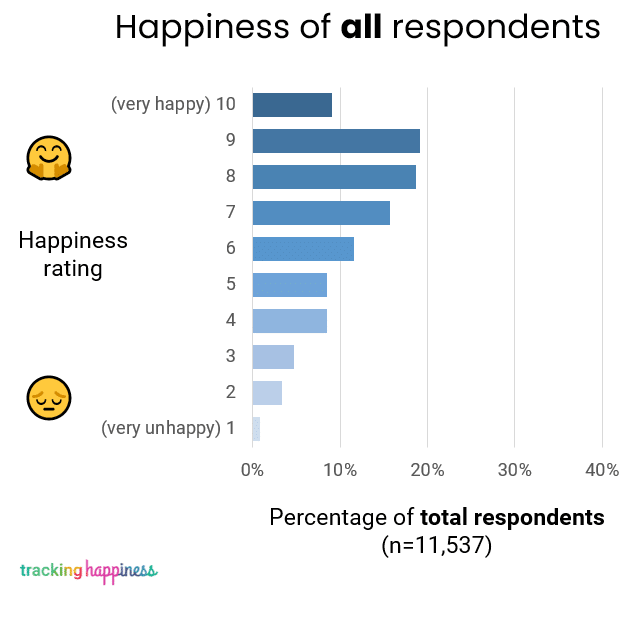
The average happiness rating of all 11,537 respondents was 6.90.
We then asked about their diet, and grouped the results in the following categories:
- Vegan (n=1,179)
- Vegetarian (n=948)
- Pescatarian (n=422)
- Meat-eater (n=8,988)
Our data showed that meat-eaters scored the lowest average happiness rating.
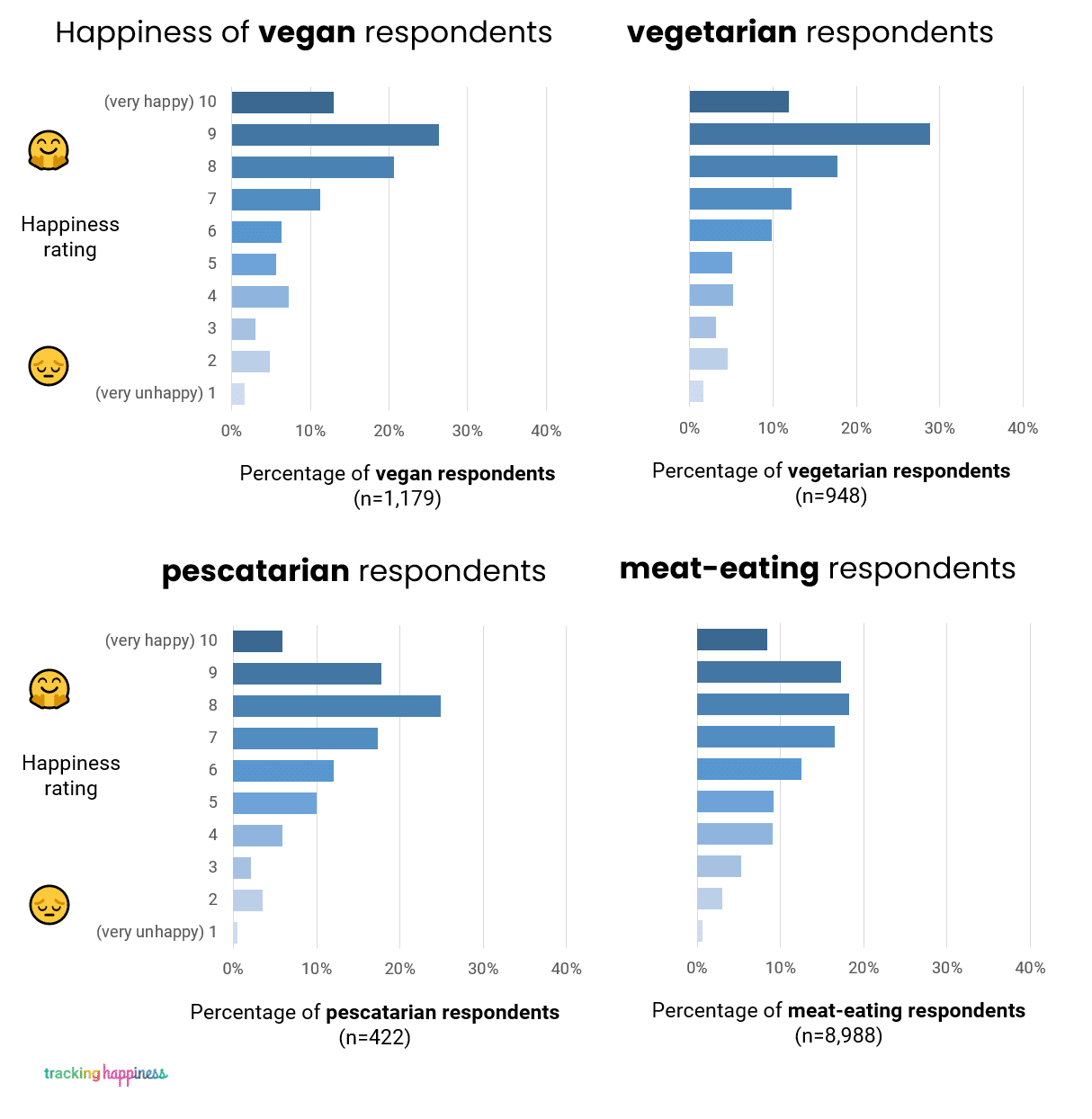
The average happiness rating of each group was calculated:
- Vegans: 7.27
- Vegetarians: 7.31
- Pescatarians: 6.99
- Meat-eaters: 6.80
- Total average: 6.90
What experts say…

Mimi Bekhechi – PETA Vice President of International Programmes
It’s no wonder vegans are happier – by sparing animals atrocious suffering, helping to save the planet, and improving their own health, vegans can enjoy peace of mind and a clean conscience. If you want to join the happy v-gang, you’re in luck: going vegan has never been easier or tastier.
What experts say…

Francine Jordan – Spokesperon for the Vegan Society
We’re not surprised by these findings at all. We know that the image of veganism is undergoing the most radical change in its history, while shedding some tired, old stereotypes. It’s no longer portrayed as an unusual lifestyle, it’s easy and accessible – you can walk into any supermarket and be greeted by a huge range of plant-based products or walk into any restaurant and be presented with an exciting vegan menu. There has never been a better time to be vegan and it’s great to see that vegans are much happier too!
Based on 11,537 respondents, our data shows that vegans are happier than the average person.
Vegans report 7% higher happiness ratings than meat-eaters.
Interestingly, we found that happier individuals consider themselves more likely to turn vegan in the future. Out of the 8,988 meat-eaters in our survey, we found that those who reported higher happiness ratings were more likely to adopt a 100% plant-based diet in the future.
The chart below shows the likelihood to go vegan on a scale from 1 to 5, averaged for each happiness rating. For example, people who reported their happiness with a 7 scored an average likelihood of going vegan of 2.03.
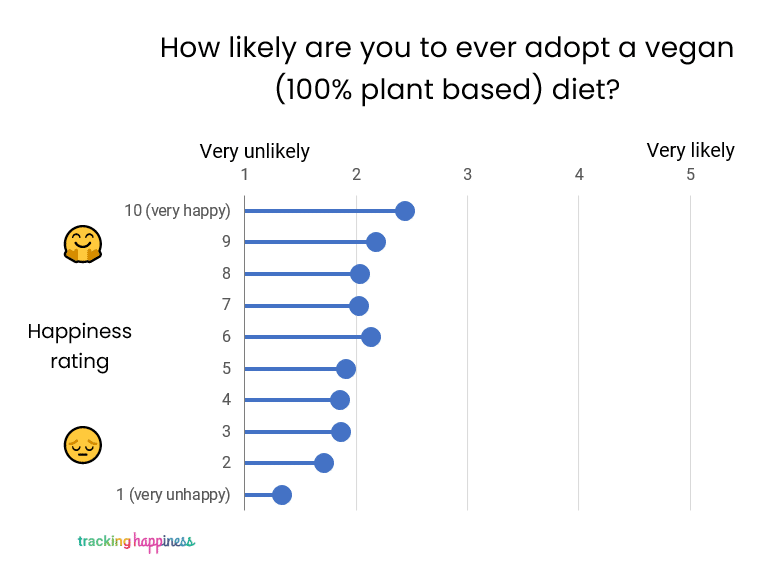
This could explain why vegans consider themselves to be happier than non-vegans. Perhaps, happier people are in a better state of mind before considering going 100% vegan. Someone that is already unhappy might be less tempted to give up the consumption of animal products.
Happier people are more likely to turn vegan in the future.
But not only are happier people more likely to turn vegan, vegans are also more likely to stay happy based on the 11,537 answers in our survey.
How negative is the stigma of vegans today?
As stated in the intro, there are numerous negative vegan stereotypes floating around.
Our survey shows that vegans report higher happiness ratings than others. But what about the negative stigma of vegans? Do people think as negatively about vegans as some of these stereotypes have you believe?
We asked our (meat-eating) respondents the following question:
- What’s your opinion on vegans (or veganism)?
We analyzed the answers and found some interesting statistics.
Less than 15% of people has a negative opinion of vegans and veganism in general.
In fact, the average meat-eater in our survey thinks positively about vegans (3.44 on a scale from 1 to 5).
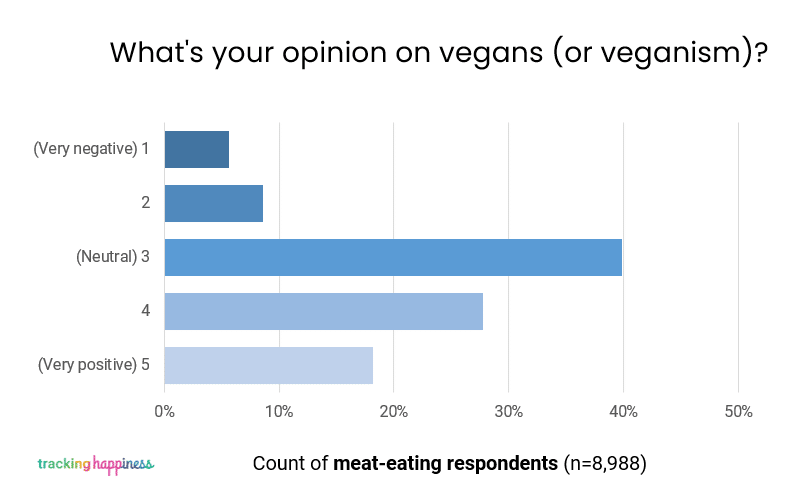
This is far better than what’s commonly believed.
In fact, a well-known and often quoted study from 2015 reported contradicting prejudices. The study – aptly named ‘It ain’t easy eating greens’ – found that only drug addicts face more hatred and prejudices than vegans. The study was performed using a similar survey technique but included only 278 respondents in total.
One particular paragraph of the study said:
Strikingly, only drug addicts were evaluated more negatively than vegetarians and vegans.
It ain’t easy eating greens: Evidence of bias toward vegetarians and vegans from both source and target
This study was brought to worldwide attention and was covered by numerous publications. For example, the BBC opened their coverage on the study as follows:
People love to moan that vegans are annoying: research has shown that only drug addicts inspire the same degree of loathing.
The hidden biases that drive anti-vegan hatred
This implies that out of all groups of people, only drug addicts are ‘loathed more’ than vegans. However, the study only looked at a limited number of groups, and the differences are nowhere near as big as they’re made out to believe:
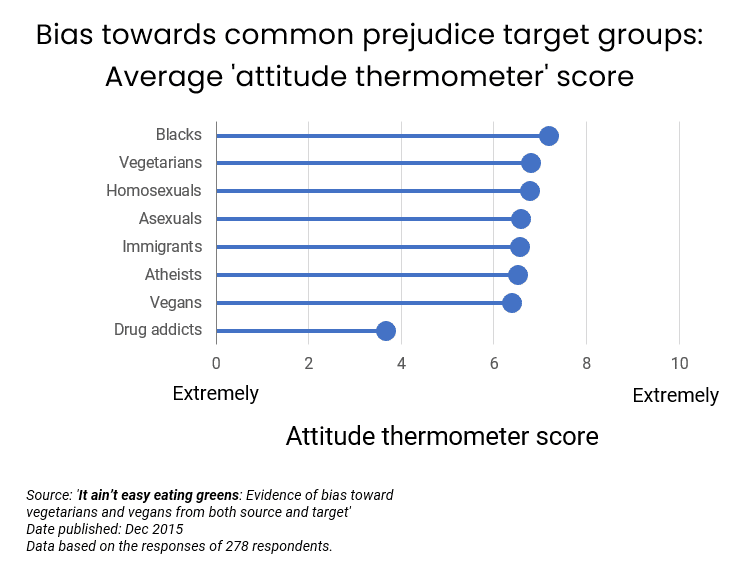
The authors of this 2015 study didn’t include a chart of the data in their release. We created this chart ourselves based on the study’s data, which reveals why the authors might have chosen to leave it out of the study’s release.
Yes, it’s true that vegans are ranked second to last in this study. But the introduction of the BBC article states that “only drug addicts inspire the same degree of loathing“, which is simply not true. Furthermore, the authors of the study went on to say “Strikingly, only drug addicts were evaluated more negatively than vegetarians and vegans“. In our opinion, this is highly sensational as the difference between vegans and drug addicts is far bigger than any other difference in attitudes. Not only does this statement misrepresent the actual data, but the study also considers only 8 groups of people. Additionally, the sample size of 278 is relatively small.
We found that the negative bias towards vegans is far less significant than what the negative stereotypes imply.
What experts say…

Carleigh Bodrug – Founder of Plant You – 496,000 followers @plantyou
The perception of vegans has definitely shifted to a more positive light in the last five years, in my experience. I personally believe this is because of education on the impact animal agriculture has on our precious earth, being one of the leading sources of greenhouse gas emissions and global warming. This, coupled with the introduction of more delicious plant-based products on the market, has made people more open to a discussion about reducing their animal product consumption.
What experts say…

Lindsay Nixon – CEO of Happy Herbivore
After I went vegan, friends commented I seemed happier and more centered. Between the healthy plant food I was eating and the harmony between my heart and lifestyle, it’s no surprise I was happier and joyous.
How likely are meat-eaters to adopt a 100% plant-based diet in the future?
The 8,988 meat-eaters in our survey were asked the following question:
- How likely are you to ever adopt a vegan (100% plant-based) diet?
Respondents answered this question on a scale from 1 to 5, respectively labeled “Very unlikely” and “Very likely”.
Only 16% of meat-eaters consider themselves likely to ever adopt a 100% plant-based diet.
The average meat-eater in our survey considered the likelihood of adopting a vegan diet to be 2.05 on a scale from 1 to 5.
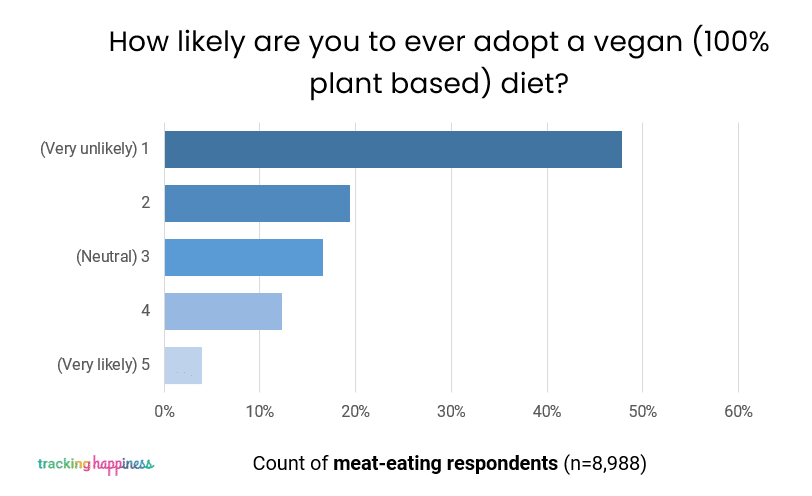
Interestingly, we observed a number of differences between our survey respondents.
For example, we found that the likelihood of ever adopting a plant-based diet is inversely correlated with a person’s age.
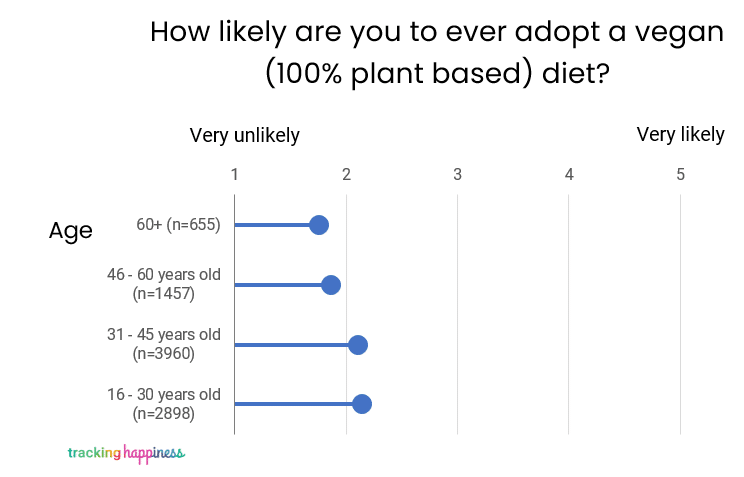
The average likelihood of adopting a plant-based diet per age group:
- 60+ years (n=655): 1.76
- 46-60 years (n=1,457): 1.87
- 31-45years (n=3,960): 2.11
- 16-30 years (n=2,898): 2.14
Older people are significantly less likely to ever adopt a 100% plant-based diet.
In addition, we found that when people are already reducing their consumption of animal products, they are 220% more likely to adopt a 100% plant-based diet in the future.
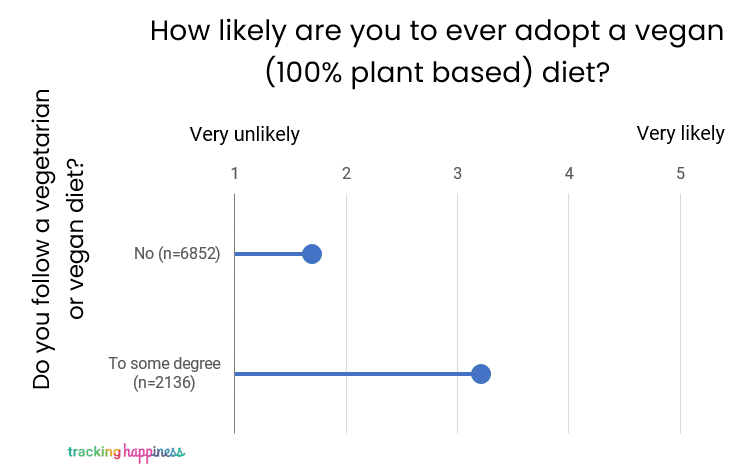
Comparing a vegan’s motives to their self-reported happiness levels
Whenever a respondent claimed to be 100% vegan or vegetarian, we asked a follow-up question:
- What’s the biggest reason for your dietary choices?
This resulted in the following answers:
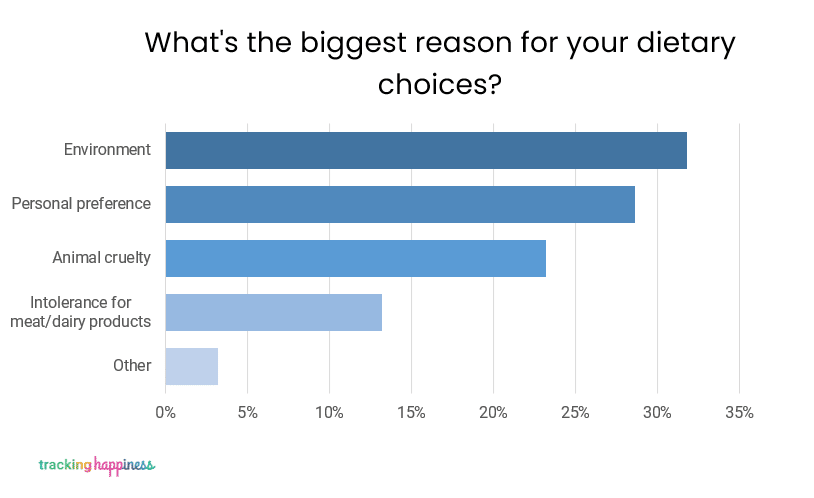
The biggest motives for the respondents’ dietary choices were:
- The impact on the environment: n=810
- Personal preference: n=729
- Animal cruelty: n=591
- Intolerance for meat/dairy products: n=337
32% of the surveyed vegans and vegetarians state that the environment is their biggest motive.
We then compared the different motives to the average self-reported happiness ratings of our respondents:
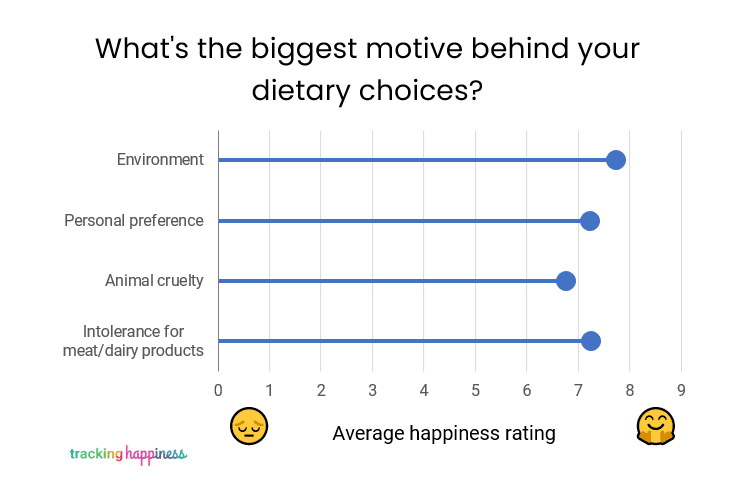
Based on our results, we found that:
People that choose to be vegan/vegetarian to counter animal cruelty are the least happy when compared to other motives.
People that choose to be vegan mainly to help reduce their impact on the environment are the happiest. These people report an average happiness rating of 7.72.
People that are vegan in order to counter animal cruelty are the least happy, with an average happiness rating of 6.77. This specific group of people even reported slightly lower happiness ratings than meat-eaters (-0.03).
Is the world becoming more accepting of veganism?
Our study reveals that vegans are not as loathed as some studies have you believe. But is the world actually becoming more accepting of veganism?
According to the data of Google Trends, search interest in veganism has been somewhat plateauing for the last 4 years in the United States.
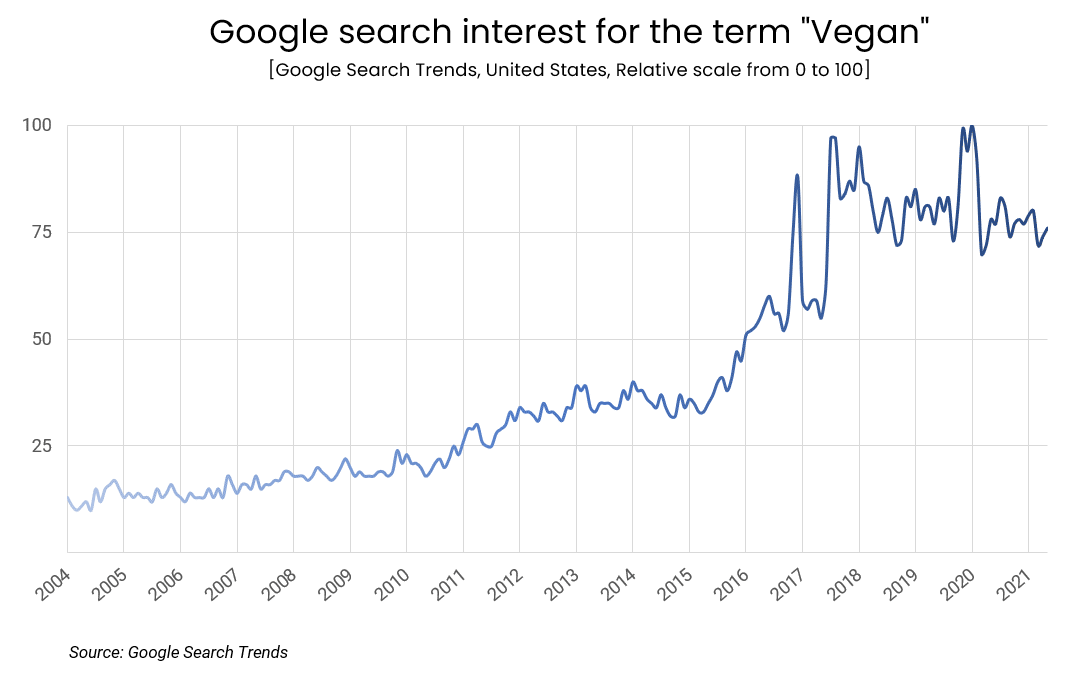
It’s hard to answer this question based on the popularity of the word “Vegan” as a search term in Google.
However, given our study results, it can be said that the world is slowly becoming more accepting of veganism. We say that because the age of our survey respondents was inversely correlated with their likelihood to go vegan in the future. In other words, young people consider themselves more likely to adopt a plant-based diet in the future.
Based on these results, it can be assumed that the world will become more vegan as people slowly age and make room for new generations. According to our 11,537 respondents, these new generations will be more likely to accept veganism.
With that said, there is data that suggests otherwise. Some studies indicate that meat consumption in the United States is currently at an all-time high.
Based on data compiled by Our World In Data, the production of meat has been rising consistently without any visible sign of stopping.
The importance of reducing the consumption of animal products
In today’s world, consuming information is becoming easier and easier, as most news articles, Wikipedia pages and documentaries are just 3 clicks away. In recent years, a number of popular Netflix documentaries have raised awareness of the importance of reducing our consumption of animal products. This availability of information is believed to be a large driver for the increased popularity of veganism.
For example, ‘David Attenborough: A Life on Our Planet’ has raised awareness for the fragile nature of the world’s ecosystems. It shows how the world cannot be sustainable if its >7 billion inhabitants continue to consume animal products.
“We live our comfortable lives in the shadow of a disaster of our own making. That disaster is being brought about by the very things that allow us to live our comfortable lives.”
David Attenborough: A Life on Our Planet
This documentary efficiently shows the environmental impact that consuming animal products has on the environment.
However, consuming animal products also has an enormous impact on the well-being of the animals themselves. The documentary “Earthlings” (2008) shows the impact that humans have on animals in a controversial way. Many describe the documentary as a horror film, and people often credit it for turning them vegan.
“If slaughterhouses had glass walls, we would all be vegetarians.”
Joaquim Phoenix – Narrator of ‘Earthlings‘ (2008)
Finally, adopting a plant-based diet comes with many health benefits as well. A recently published review by Healthline provides science-based health benefits of eating vegan, amongst which:
- Veganism is linked to a lower risk of heart disease
- A vegan diet may protect against certain cancers
- Veganism appears to lower blood sugar levels and improve kidney function
- A vegan diet can reduce pain from arthritis
In the end, it’s clear that adopting to a plant-based diet is beneficial for the environment, animal wellfare and your health.
Commentary from the team:

Hugo Huijer, Founder of Tracking Happiness
Why do we care about this topic at Tracking Happiness? Because we believe that happiness and sustainability go hand in hand. Sustainable behavior is linked to increased mental health, which is why it’s so important to talk about the consumption of animal products. Even though the positive environmental effect of veganism cannot be disputed, there is still a negative stigma surrounding people who claim to be vegan.
One of our readers even emailed us recently that he feels such a nuisance whenever he has to notify someone else of his vegan diet.
We landed on this study subject when we found that data on vegan stigmas and happiness is either lacking or outdated. And since it’s clear that people generally only change their opinions when faced with new data and facts, we want to provide a meaningful source of information that could stimulate this change. We sincerely hope that our findings help people make informed decisions regarding sustainability, happiness and the consumption of animal products.
Methodology
If you’re curious to learn more about our methodology, here’s a link to our study appendix that explains it all (opens in a new window):
Fair use and redistribution
Tracking Happiness grants you permission to reuse, host, or repost the graphics and images from this article. When doing so, we ask that you kindly attribute the authors by linking to Tracking Happiness or this page.
Closing words
We hope you find this study interesting and useful, especially since veganism is a topic that is very polarizing. No matter if you are currently a vegan or a meat-eater, we hope that this study can positively contribute to any future discussions you may have.
What’s your main takeaway from today’s study? Or maybe you have a question about something from the analysis. Either way, leave a comment below to let us know.

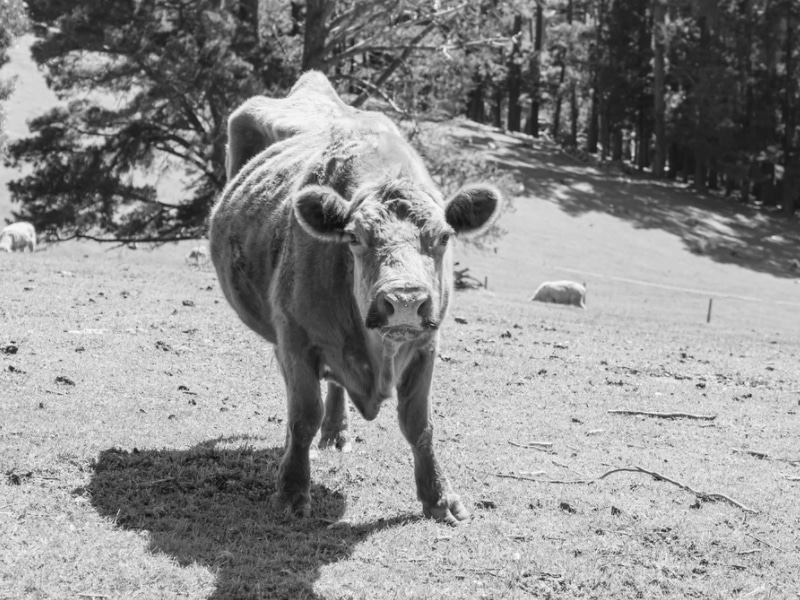
I have been vegan for some 38 years now. Initially I went vegetarian some 44 years ago over animal welfare and vegan due to a cheese allergy. Over time I felt happier and happier as the myths over protein were dismissed. Also the case for the environment and the impact of intensive farming became ever more evident over time. I tried avoiding leather at one point but found shoes difficult to source although there are more options now. I am nearly 70 now, yet remain very healthy with little in the way of aging effects which has been a bonus. The only caveat being, watch B12 levels, a deficiency can have a very negative effect on the nervous system. Take supplements would be my advice, to anyone going vegan and watch out for yellowing skin.
Love the article! I’m vegan and feel happier to see it. Thanks for sharing.
The correlation between why is people that choose animal rights = less happy is because we make a conscious decision daily to acknowledge the horrors of torture that other innocent sentient beings endure because religious fanatics have been brainwashing people to believe that a human cannot live a healthy life without eating other life forms. Meat-eaters will be shown to have an overall lower IQ, and are more self-centered, macho, and believe that the sole reason that animals exist is for us to kill them. They also believe that the earth is here for the sole purpose of exploitation. Dirt bike, monster trucks, utvs, speed boats, etc. Statistics can be construed to show whatever one wants. True veganism is NOT just a diet. It’s an entirely different way of viewing life on this earth. I’ll bet in further research you will find a larger proportion of vegans just happen to be atheists and vice versa. Also non-heterosexual, minimalist, champions for equality, the environment, and preservation of this earth. With all of this on our agenda, vs non-caring, selfish, self-absorbed, self-centered, meat-eating cavemen, is it really any wonder why we might be just a tad less happy ? 🐶🐶🐶